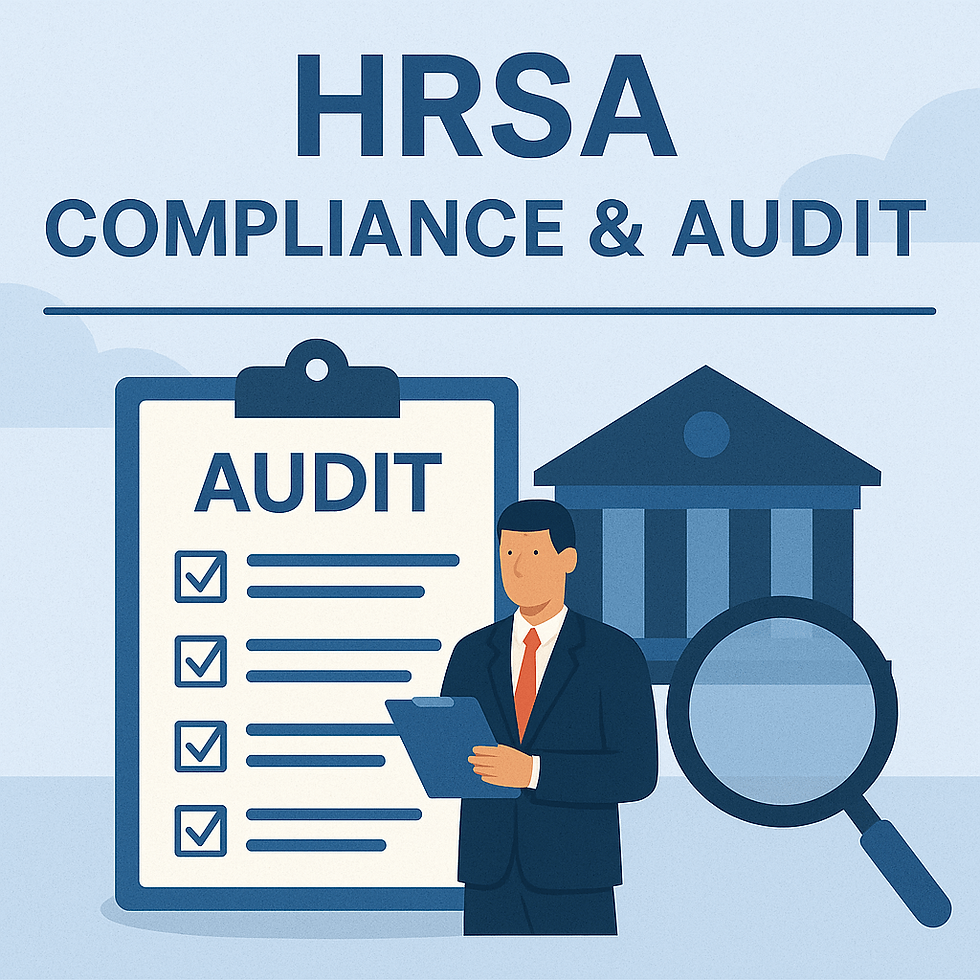The Benefits of 340B Consulting For Drug Pricing Program
- Edward Vargas
- Aug 5
- 6 min read
The alarm sounds at 5:30 AM.
A hospital pharmacy director jolts awake to the same stomach-churning realization: HRSA auditors arrive next week. Thousands of prescriptions, hundreds of patient records, and dozens of contract pharmacy arrangements await scrutiny.
The 340B program that saves the hospital millions annually now threatens to become its biggest liability.
This scenario plays out in health centers and hospitals nationwide. For the analytical healthcare administrator who thrives on precision and values data integrity, 340B audit preparation represents both a significant challenge and strategic opportunity.
Why 340B Expert Audit Readiness Matters Beyond Compliance
The 340B drug pricing program delivers substantial benefits to healthcare organizations serving vulnerable populations. Yet many pharmacy directors and compliance officers view audit preparation as a necessary evil rather than a strategic advantage.

"Organizations often approach 340B audits reactively instead of proactively," explains Edward Vargas, founder of Virtue340B. "They scramble when HRSA announces an audit rather than maintaining continuous readiness. This reactive approach not only increases stress but also limits their ability to maximize program benefits."
For the methodical healthcare administrator, audit readiness offers advantages beyond avoiding findings:
Improved data quality that supports better decision-making
Increased confidence in contract pharmacy arrangements
More accurate financial forecasting based on verified savings
Reduced operational disruption during actual audits
Protection against manufacturer challenges to 340B pricing
The data-focused healthcare leader understands that audit readiness isn't just about compliance—it's about optimization. When systems track eligible patients and prescriptions accurately, organizations capture all legitimate savings while maintaining program integrity.
Building a Comprehensive 340B Audit Framework with Expert Consulting Solutions
The methodical healthcare administrator knows effective audit readiness requires structured approaches. A robust 340B audit framework incorporates multiple elements to maintain compliance while optimizing program benefits.
Risk-Based Audit Approaches
"A risk-based approach to auditing proves most effective," Vargas notes. "Organizations should focus their monitoring efforts on high-risk areas like contract pharmacy arrangements, duplicate discounts, and patient eligibility," emphasizes the need for a dedicated team of 340B professionals.
The analytical administrator prioritizes resources toward areas with greatest compliance risk, maximizing effectiveness of audit activities while minimizing operational disruption.

Documentation Systems for 340B Compliance
Comprehensive documentation forms the backbone of audit readiness. Healthcare organizations need structured systems capturing policies, procedures, and compliance decisions.
Virtue340B consultants recommend these audit framework components:
Structured documentation of 340B program policies and procedures
Regular internal audits conducted by pharmacy program staff
Independent third-party reviews providing objective assessment
Continuous monitoring systems tracking compliance metrics
Corrective action processes addressing identified issues
Staff training programs ensuring operational compliance
Audit Frequency and Sampling Methodology
The detail-oriented healthcare leader establishes appropriate audit schedules and sampling methodologies. These processes balance thoroughness against resource constraints.
"Sampling methodologies should reflect program complexity," Vargas explains. "Larger programs with multiple contract pharmacies require more extensive sampling than smaller operations."
Healthcare organizations implementing comprehensive audit frameworks report fewer findings during HRSA audits and greater confidence in program integrity.
The Data Management Imperative for 340B Compliance
For the analytical healthcare administrator, data integrity forms the foundation of 340B compliance. Effective data management practices prevent common audit findings while supporting program optimization.
Data Collection and Verification Processes
"Poor data management leads to significant financial losses and compliance issues," Vargas explains. "We've seen organizations lose hundreds of thousands in legitimate savings because their data systems weren't properly configured."
Effective 340B data collection includes:
Automated data capture reducing manual entry errors
Verification processes confirming patient eligibility
Documentation of prescription qualification decisions
Integration between pharmacy systems and electronic health records
Audit trails tracking data modifications
Reporting Systems for 340B Program Management Providers
The methodical administrator implements robust reporting systems supporting both compliance verification and program optimization.
Effective 340B reporting includes:
Clear reporting frameworks supporting audit readiness
Regular data integrity checks identifying anomalies
Analytics identifying potential compliance issues
Performance metrics tracking program benefits
Exception reports highlighting unusual patterns can help the client navigate potential compliance issues related to 340B pharmacy practices.
Data Security and Access Controls in Hospitals
Healthcare organizations must protect sensitive 340B program data while ensuring appropriate access for authorized personnel.
"Data security represents both a compliance requirement and operational necessity," Vargas notes. "Organizations must implement appropriate controls while maintaining operational efficiency."
The detail-oriented healthcare leader recognizes that data management extends beyond technology. Staff must understand data flows and verification processes to maintain program integrity.
Contract Pharmacy Management is A Critical Compliance Area
Contract pharmacy arrangements present particular challenges for 340B program compliance. The administrator recognizes these relationships require specialized oversight with certified experts who bring unique consulting solutions.
Contract Pharmacy Agreement Documentation
"Contract pharmacy arrangements face increasing scrutiny from both HRSA and manufacturers," Vargas points out, as the team of 340B experts navigates the complexities involved. "Organizations must implement robust monitoring systems to prevent diversion and duplicate discounts."
Comprehensive written agreements define:
Responsibilities for each party
Compliance requirements and verification processes
Data sharing protocols and security measures
Audit rights and procedures
Corrective action processes
Preventing Duplicate Discounts in Contract Pharmacy Arrangements
The analytical administrator implements systems preventing duplicate Medicaid discounts, a common compliance finding.
Effective prevention strategies include:
Medicaid carve-out files preventing 340B claims for Medicaid patients
Verification processes confirming patient insurance status
Regular audits of contract pharmacy claims
Documentation of prevention methodologies
State-specific approaches reflecting Medicaid program differences
Monitoring Contract Pharmacy Performance
Healthcare organizations must verify contract pharmacies dispense 340B medications appropriately.
"Regular monitoring identifies potential compliance issues before they become significant problems," Vargas advises.
Virtue340B provides specialized consulting services for contract pharmacy oversight, helping covered entities maintain compliant relationships while maximizing program benefits.
The Human Element of 340B Compliance and How The Program Brings a Better Quality of Care
The 340B program touches multiple departments within healthcare organizations. The analytical administrator understands comprehensive training prevents compliance gaps.
Role-Specific Training Programs

"Training needs to be tailored to specific roles," Vargas advises. "A pharmacy technician needs different information than a C-suite executive, but everyone should understand the program's purpose and their role in maintaining compliance."
Effective role-specific training addresses:
Daily operational responsibilities
Compliance requirements relevant to specific functions
Documentation practices supporting audit readiness
Common pitfalls and prevention strategies
Escalation procedures for compliance concerns
Organizational Awareness Beyond Pharmacy
The methodical administrator extends 340B training beyond pharmacy departments, recognizing that the program touches multiple organizational areas.
Training for non-pharmacy staff covers:
Program purpose and patient benefits
Basic eligibility requirements
Compliance importance and organizational risk
Department-specific responsibilities
Communication channels for compliance questions
Ongoing Education and Regulatory Updates
Healthcare organizations must keep staff current on regulatory changes affecting 340B program compliance.
"The regulatory environment continues evolving," Vargas notes. "Organizations must update training materials and communicate changes effectively."
Healthcare organizations investing in comprehensive training report fewer compliance issues and greater program optimization.
340B Implementation and Setting the Foundation for Success
For health systems implementing or expanding 340B programs, proper setup determines long-term success. The detail-oriented administrator recognizes implementation requires both technical expertise and strategic vision.
Eligibility Assessment and Program Registration
"Many compliance issues trace back to implementation decisions," Vargas notes. "Organizations rushing implementation often create structural problems that prove difficult to correct later."
Comprehensive eligibility assessment includes:
Verification of qualifying status
Documentation of eligible patient definition
Identification of eligible locations
Assessment of contract pharmacy opportunities
Registration with HRSA and pharmaceutical distributors
System Configuration and Integration
The analytical administrator ensures proper configuration of pharmacy systems and integration with existing healthcare technologies.
Implementation considerations include:
Accurate setup of purchasing accounts
Integration with electronic health records
Configuration of split-billing software
Establishment of virtual inventory systems
Testing of data flows between systems
Policy Development and Documentation
Healthcare organizations must develop comprehensive policies before program launch.
"Well-documented policies provide operational clarity and consistency," Vargas explains. "They also demonstrate compliance intent during audits."
Virtue340B consultants provide implementation support for healthcare organizations entering the 340B program or expanding existing operations, helping establish compliant foundations.
Preparing for HRSA Audits
When HRSA announces an audit, healthcare organizations must demonstrate program compliance. The analytical administrator prepares methodically, focusing on documentation and data verification.
Pre-Audit Assessment and Mock Audits
"Organizations should conduct mock audits regularly," Vargas recommends. "This identifies potential issues before actual HRSA auditors arrive."
Effective pre-audit activities include:
Review of policies against current regulations
Verification of sample prescription eligibility
Assessment of contract pharmacy arrangements
Documentation of self-disclosed issues and corrective actions
Preparation of the responsible staff for interviews
Documentation Organization, and Presentation
The methodical administrator organizes documentation strategically, facilitating efficient review by HRSA auditors.
Organized documentation includes:
Policies and procedures in standard format
Evidence of regular self-audits and monitoring
Records of staff training and competency assessment
Documentation of compliance decisions and rationales
Corrective action plans addressing identified issues
Response Strategies for Audit Findings
Healthcare organizations must prepare for potential findings, developing response strategies addressing identified issues.
"A proactive response demonstrates commitment to compliance," Vargas notes. "This often influences the auditor's assessment of the significance of findings."
Virtue340B provides specialized HRSA audit support, helping covered entities prepare documentation, verify compliance, and respond effectively to auditor requests.
Next Steps for 340B Program Excellence
Healthcare organizations seeking to strengthen their 340B programs should start with a comprehensive assessment. This evaluation identifies both compliance risks and optimization opportunities.
For those looking to enhance their 340B program management, connecting with specialized experts provides valuable insights. With proper guidance from experienced 340B consultants, the program helps healthcare organizations serve vulnerable patient populations while maintaining compliance.
The methodical healthcare administrator recognizes that excellence in 340B program management combines rigorous compliance with strategic optimization. By building robust audit frameworks, implementing effective data management practices, and working with experienced consultants, healthcare organizations transform compliance activities into strategic advantages.



